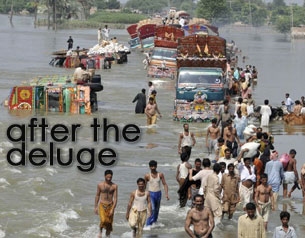This cutting-edge documentary reveals the true extent of the damage of the monsoonal rainstorm that swept Pakistan. With filming only completed within the last fortnight it asks, will the slow response of the international community signal the dawn of an even more dangerous Pakistan, in which militant Islam comes to the rescue?
"We got no prior warning, the water came on us suddenly. We left our houses bare foot". A frantic mother clutches her child in the Punjab region of Pakistan: most of the area's fertile land is now underwater, and people live perched on top of levy banks. Sick and frightened, they'll accept any form of aid, even from terrorists:
"The only thing we know is that God has sent them to help us.."
"Even people like us did not know what was happening", says Imran Khan,
"gradually you began to realise that 20 million people would be affected." In the last days preceding the torrential downpour in the north of Pakistan, the weather warnings were modest. The people of the picturesque Swat Valley were hoping to re-establish the region as a tourist spot, erasing the memory of a Taliban stronghold. But a rolling wall of water swept away their dreams.
"I saw the hotel falling down in front of my eyes", says Mohammed Rider,
"there's just my life and my children left".
Parents lose children, farmers lose crops, people are killed, and diseases like cholera spread. Yet the response from the international community is alarmingly slow.
"The threats from the Taliban to foreigners who assist flood victims is certainly limiting our response", says one aid worker. Local aid comes with a price. In return for a single ration card, this old man is enlisted to rebuild the road in his town. He walks three hours to get a bag of flour:
"It is tiring but we have no choice."
Jamaat-ud Dawa, a group closely associated with the militant Islamic group responsible for the 2008 attacks on Mumbai, step in to fill the gap:
"They are very courageous people", says one woman receiving food from the leader of the Jamaat-ud Dawa, Abdullah Obaid. Abdullah says the Pakistan military welcome his efforts. We see him working alongside the army, and even storing his goods in military vehicles. Whilst a devastated country attempts to piece their lives together, the threat of being radicalised by their saviours is very real.
The world community has given substantial aid to Pakistan. But the world has stopped watching and is tired of giving, never having had great faith in the Pakistan government. The United Nations say aid has fallen short of what is needed by 35%.
"This is not about paying Pakistan's bills", appeals Mosharaff Zaidi,
"this is a humanitarian crisis". When Pakistan asks for a loan to restore their economy, who will respond?
LEARN MORE.
WATCH MORE.
JOIN THE DISCUSSION.
 This cutting-edge documentary reveals the true extent of the damage of the monsoonal rainstorm that swept Pakistan. With filming only completed within the last fortnight it asks, will the slow response of the international community signal the dawn of an even more dangerous Pakistan, in which militant Islam comes to the rescue?
This cutting-edge documentary reveals the true extent of the damage of the monsoonal rainstorm that swept Pakistan. With filming only completed within the last fortnight it asks, will the slow response of the international community signal the dawn of an even more dangerous Pakistan, in which militant Islam comes to the rescue?


